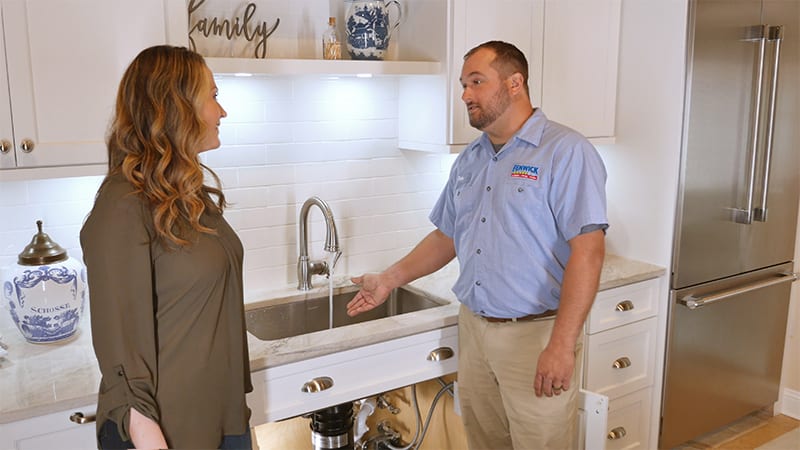
There are a few simple procedures that you can perform around the house that will help maintain your basic plumbing equipment and keep your system operating at its peak performance level. These are all simple tasks that should become part of your periodic routine. They may seem trivial at first glance, but they can contribute to your plumbing system’s upkeep and overall performance and help extend the life of your system.
Suggestions In and Around the House
Outside
- Before you do any digging, beware of water pipes, gas lines, drainage lines and electrical lines that lay below the surface. Call before you dig or plant trees or shrubs so you don’t put them over a sewer line.
- To prevent assorted water valves from sticking, fully open and close all your outdoor and indoor valves, as well as the cutoff valves a couple times every year. Don’t forget the main shut off valve at the water meter. Give each one a shot of WD40 while you’re at it. That may come in handy in the event of a busted water pipe inside your home.
- Have an emergency number handy for your plumber. Fenwick Home Services is a good number to have in Jacksonville. You want a plumber who can provide you with 24/7 emergency service if you can’t handle the situation.
- Insulate any water pipes that are vulnerable to freezing temperatures and cold winds. You can purchase handy pipe wrap insulation made for that specific application.
- Shut off water supply valves (on the inside) leading directly to outside faucets and leave those faucets open to allow all water to drain.
- If your lines freeze, thaw them with an electric hair dryer or electric heat gun. Never use a blow torch.
- Keep drains open especially in basements and sinks that are rarely used where a freeze could occur. Pour water down them once a month.
- Be careful about what you pour down your kitchen sink. Never put coffee grinds, cooking oil or any grease or fat down the drain and never use lye to clear your drains.
- Everyone seems to put waste cans and garbage pails under the kitchen sink. Cans bumping against those pipes can dislodge them and cause water leaks.
Toilets
Toilets bring their own issues to bear. A routine inspection at least once a year can save major cleanup down the line.
- Clean the parts inside the tank to remove rust and mineral buildup that can cause those parts to stick or freeze in place and prevent the system from flushing. After cleaning, lubricate any parts that are not submerged.
- Children should be taught that toilets are only used for two reasons. They are not playthings. Keep heavy objects off shelves above the toilet and do not use the tank top as a shelf. Adults should not use the toilet to flush sanitary napkins, paper towels or disposable diapers. All those objects are guaranteed to clog a toilet, cause a mess and a probable visit from a plumber
Dishwashers
When running the dishwasher, don’t over pack it.
Garbage Disposals
Grind small amounts at a time while running cold water down the drain at full force.
Bathtubs/Showers
- Check the grout in the shower and be sure to caulk around the edges and corners of your tub and shower enclosures as well as the door tracks. Look for and seal any gaps that allow water to leak onto the bathroom floor or between the walls.
- A cup or two of vinegar down the shower drain will help dissolve any crud. After letting it sit for 15 minutes, pour a couple gallons of very hot water down the drain.
- Clean your shower head by tying a plastic bag filled with a cup of vinegar over the head. That will break up any mineral deposits and keep a full spray pattern going.
Water Heater
- Drain your hot water tank at least twice a year to remove sediment that accumulates in the bottom. Those impurities can corrode the tank and cause it to fail long before its time.
- Open the drain on the water heater twice a year to remove sediment.
- When you leave home for an extended vacation, give your heater a vacation too. Shutting off the power can prolong its life.

